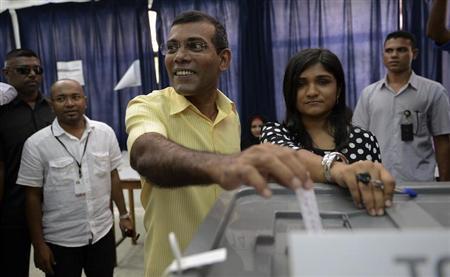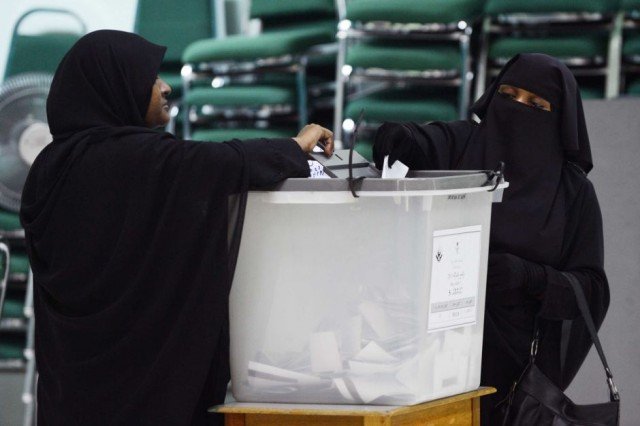Home Tags Posts tagged with "maumoon abdul gayoom"
maumoon abdul gayoom
The Maldivian Supreme Court has suspended the presidential election run-off, after protests from a candidate.
On Saturday, ex-President Mohamed Nasheed polled nearly 47%, just short of the 50% needed for outright victory.
The second round was to have taken place on Sunday, but the runner-up Abdulla Yameen sought a delay, saying he needed time to campaign afresh.
Mohamed Nasheed has been seeking to regain power after he was forced to resign in 2012, sparking a political crisis.
This is the third time the presidential elections have been derailed.
A vote on September 7 was annulled by the Supreme Court after one candidate, Gasim Ibrahim, alleged irregularities, despite observer groups deeming the vote free and fair. The court also introduced new guidelines for elections.
Police then halted a planned re-run on October 19 saying the guidelines had not been met, after both Gasim Ibrahim and Abdulla Yameen failed to approve the voter register.

Maldives’ ex-President Mohamed Nasheed polled nearly 47 percent, just short of the 50 percent needed for outright victory
This time, the run-off was planned for only one day after the first round, because the constitution stipulates there must be a new president by Monday.
Despite that legal deadline, the Supreme Court sitting late at night has now ruled that the run-off “cannot take place” and ought to be delayed by six days.
The court said the Sunday run-off might have “undermined the constitutional rights of many people”, agreeing with Abdulla Yameen’s assertion that he needs more time to campaign.
Mohamed Nasheed won Maldives’ first-ever democratic vote in 2008, replacing Maumoon Abdul Gayoom, who ran the country autocratically for three decades.
On Saturday, Mohamed Nasheed polled 46.93% of vote, while Abdulla Yameen, the half-brother of Maumoon Abdul Gayoom, polled 29.73%.
Third-placed Gasim Ibrahim, a wealthy resort owner and a former minister under Maumoon Abdul Gayoom, was out of the running with 23.34%.
The suspension of Sunday’s voting means there cannot be a new president by the constitutional deadline of November 11, when the term of current president President Mohamed Waheed Hassan ends.
The Supreme Court had already announced that the current president could stay on but Mohamed Waheed Hassan has said he doesn’t want to.
Besides, some army officers have been circulating an appeal calling on soldiers not to obey the current president beyond the legal expiry of his term at midnight on Sunday.
The Maldivian Democratic Party – to which Mohamed Nasheed belongs – has accused Abdulla Yameen of trying to “subvert democracy”.
The ex-president resigned last year after large sections of the security forces objected to his arrest of a controversial judge.
[youtube snEGJvlmhUc 650]
Maldivian voters are going to the polls to elect a president after two previous attempts failed.
Candidates came to a last-minute agreement earlier this week to agree and sign the voter lists required for the election to take place.
In 2012, ex-President Mohamed Nasheed was forced from office, sparking a political crisis.
Mohamed Nasheed is seeking to regain power at these elections.
Tensions are high after one vote was annulled and a re-run halted by police.
“Voting got underway at 475 polling booths across the Maldives and several foreign capitals where Maldivians live,” Elections Commission official Aishath Reema told the Agence France-Presse news agency.

Maldivian voters are going to the polls to elect a president after two previous attempts failed
Supporters of Mohamed Nasheed’s opposition Maldivian Democratic Party allege the government and judiciary are attempting to influence the electoral process, fearing he will return to power.
Mohamed Nasheed, won the country’s first-ever democratic vote in 2008, ousting Maumoon Abdul Gayoom, who ran the country autocratically for three decades.
His main rival at the ballot box is Maumoon Abdul Gayoom’s half-brother, Abdullah Yameen. The other major contender is Gasim Ibrahim, a wealthy resort owner and a former minister under Gayoom.
If no candidate gets more than 50% of the vote then a second vote is scheduled to take place on Sunday.
In a vote on 7 September, Mohamed Nasheed led with 45% of the vote, while Abdullah Yameen and Gasim Ibrahim trailed with 25% and 24% respectively.
President Mohamed Waheed Hassan Manik got 5% and later bowed out.
That vote was annulled by the Supreme Court after Gasim Ibrahim alleged irregularities, despite observer groups deeming the vote free and fair. The court also introduced new guidelines for elections.
Police halted the planned re-run on 19 October saying the guidelines had not been met, after both Ibrahim Gasim and Abdullah Yameen failed to approve the registry of voters.
According to the Maldives constitution, a new president has to be in place by November 11 when the current presidential term ends.
Mohamed Nasheed was forced from office in February 2012 in what he has described as a coup. Mohamed Waheed, who succeeded him, claims Mohamed Nasheed resigned of his own accord in the face of opposition demonstrations.
[youtube s6Pt6eMhwAE 650]
Maldives President Mohamed Nasheed has stepped down after weeks of demonstrations and a mutiny by some police officers.
In an address on state TV, Mohamed Nasheed said it would be “better for the country in the current situation” if he stood down.
Vice-President Waheed Hassan has been sworn in as president after Mohamed Nasheed stepped down.
Tensions escalated after the Maldives army arrested a senior judge last month, prompting bitter street protests in the Indian Ocean island chain.
A source close to the president described Tuesday’s developments as a “coup by the former regime”.
But the army and the vice-president have denied a coup has taken place.
Waheed Hassan’s office denied widespread reports the military pressured Mohamed Nasheed to resign, the AP news agency reports.
“It was not a coup at all, it was the wish of the people,” said Ahmed Thoufeeg, Waheed Hassan’s secretary.
Mohamed Nasheed announced his resignation during a televised news conference.
“It will be better for the country in the current situation if I resign. I don’t want to run the country with an iron fist. I am resigning,” Mohamed Nasheed said.
Earlier, a group of mutinying police officers took control of the state broadcaster in the capital, Male, and began playing out messages in support of former President Maumoon Abdul Gayoom.
Several journalists were said to be detained in the facility.
Sources in the office of Mohamed Nasheed said Tuesday’s protest took place in front of military headquarters, a high-security zone.
Soldiers used tear gas to break up a demonstration by supporters of Maumoon Abdul Gayoom.
On Monday, around 50 policemen stood down in favour of the protesters and refused to obey orders.
The president’s office denied reports that the army fired rubber bullets at the protesting police officers.
Last month the army arrested a senior criminal court judge, Judge Abdulla Mohamed.
The government alleged that the judge’s rulings – such as the release of an opposition activist detained without a warrant – were politically motivated.
It claimed the dispute with the judge was not an isolated incident, but indicative of a more deep-rooted problem with the Maldives judicial system and the checks and balances it has to ensure it stays independent.
Human rights groups added their voices to calls for the judge to be released – and, as matters grew increasingly heated, there were demands for the United Nations to be brought in to resolve the dispute.
Mohamed Nasheed was elected in 2008, in the first multi-party poll.
Since then, correspondents say, the country has been gripped by constitutional gridlock – because parties opposed to the president dominate parliament.
Mohamed Nasheed, a former human rights campaigner, beat long-time ruler Maumoon Abdul Gayoom, who had been in power for 30 years and was widely seen as autocratic, in the country’s first multiparty election.
A one-time political prisoner, Mohamed Nasheed became a vocal figure in office on issues relating to the environment and climate change.
That pressure has intensified with the prospect of fresh elections, scheduled for next year. Opposition parties are jockeying for power as they try to extend their influence.
The wider question is how this crisis will affect the forthcoming elections – and what it says about the transition in the Maldives to mature democracy.


